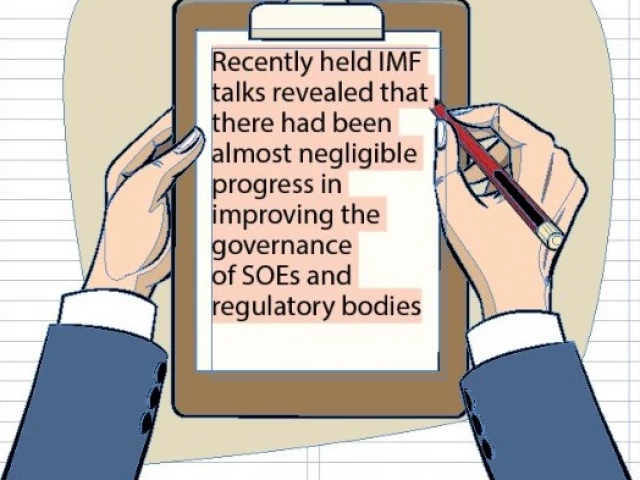Islamabad:
As the first year of the International Monetary Fund Program (IMF) of $ 7 billion, the Government has failed to bring state companies (SOE) under a new legal framework, breaking their commitments due to the resistance of these public sector companies.
The procedures of a preparatory meeting recently held for the next IMF review conversations for the section of loans of $ 1 billion revealed that there was almost insignificant progress in improving the governance of companies and regulatory agencies of the public sector, sources from the Ministry of Finance to Express PAkGazette said.
They said that entities such as the Water and Energy Development Authority (WAPDA), the Pakistan Telecommunications Corporation and the Pakistan Railways were not cooperating completely in the modification of their laws to separate the formulation of operations policies.
A year ago, when the IMF Board approved the rescue package of $ 7 billion for a period of three years, the government of Prime Minister Shehbaz Sharif promised to address the deficiencies in the legal frameworks of the SOES. The idea was to introduce international best practices for STEM losses and improve services.
But the government failed on both fronts. The legal framework of state companies did not improve or managed to privatize any entity during the first year of the IMF program. After completing a year of the program and receiving $ 2 billion of the $ 7 billion, progress remains limited to fiscal indicators.
Even in this front, despite achieving the main balance objective through greater collection of income and tax adjustments, public debt increased both in absolute and part of the economy in the last fiscal year, which is considered a double danger. The debt / GDP ratio rose above 70%, while the debt load increased to RS80.5 billion.
The Government had promised the IMF that, as part of the implementation of SoE reforms, it would extend the Law of State Companies (governance and operations), 2023, and the SOE policy (property and management), 2023, to 10 more entities to strengthen performance, transparency and governance.
These entities include the Exim Bank of Pakistan, the National Bank of Pakistan (NBP), the State Life Insurance Corporation, the Pakistan Railways, Wapda, National Telecommunication Corporation, Gwadar Port Authority, Karachi Port Trust and Port Qasim Authority.
Last month, the Minister of Finance, Muhammad Aurengzeb, wrote to other ministers of maritime affairs, water resources, information technology and telecommunications and trade ministries, urging them to meet the IMF conditions making the necessary legal changes before the visit of the IMF team.
The IMF delegation is arriving in Pakistan and will celebrate its first round of discussions with the Central Bank on September 25, the same date that the IMF Board approved the loan package a year ago. After the discussions with the Central Bank, the negotiations with the federal government will begin from September 29.
Outside the entities listed, two are under the administrative control of the Ministry of Finance: NBP and Exim Bank. However, instead of amending its laws to address government problems, the Ministry of Finance has only managed to finish the Exim Bank bill.
The sources said that the amendments to the NBP law remain pending until legal changes are made in the Law of the Sovereign Richness of Pakistan. The government previously exempt the NBP and six other entities of the SOE law by placing them under the sovereign background of wealth.
The original deadline to amend the sovereign law of the background of the idle was from December last year, now extended to March 2026.
The IMF has told Pakistan that the sovereign wealth fund should only become operational after governance safeguards for the fund and that state companies are transferred, aligning with the new SOE governance framework.
For this, the Government will also have to amend the law of the Fund of the Ralguía to clarify its mandate and strengthen governance agreements, according to the latest IMF report.
The sources also mentioned the reluctance of Wapda, which has not yet shared a draft of the new amendments. These legal changes are necessary to review their current administrative structure, dominated by the president of the authority.
The WAPDA spokesman did not respond to a request for comments on the delay in making the required amendments, which violate the IMF conditions.
Similarly, the Ministry of Information Technology has not shared drafts of amendments to the Telecommunications Law of Pakistan (reorganization), 1996. The law of nationalization of life insurance is still under consideration, not yet approved, while consultations continue in the Pakistan Railways Law of 1890.
However, the drafts of amendments to the Law of the Authority of Puerto Qasim 1973, the Ordinance of the Port Authority of Gwadar 2002 and the Law of the Port Authority of Karachi of 1980 have ended, but are still waiting for parliamentary approval.




